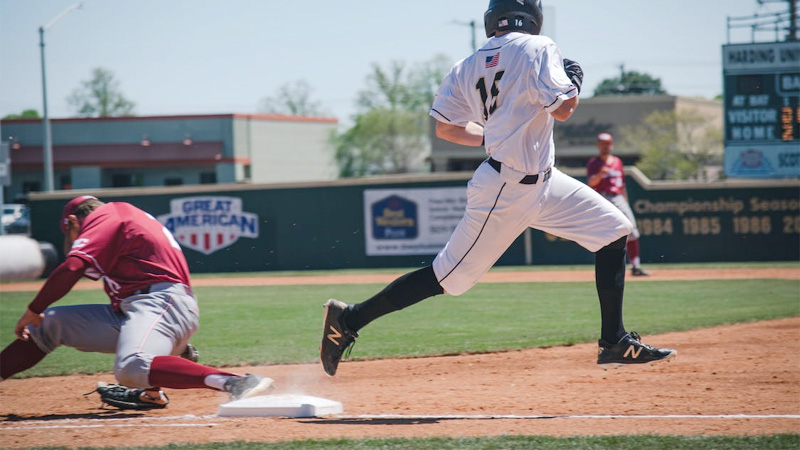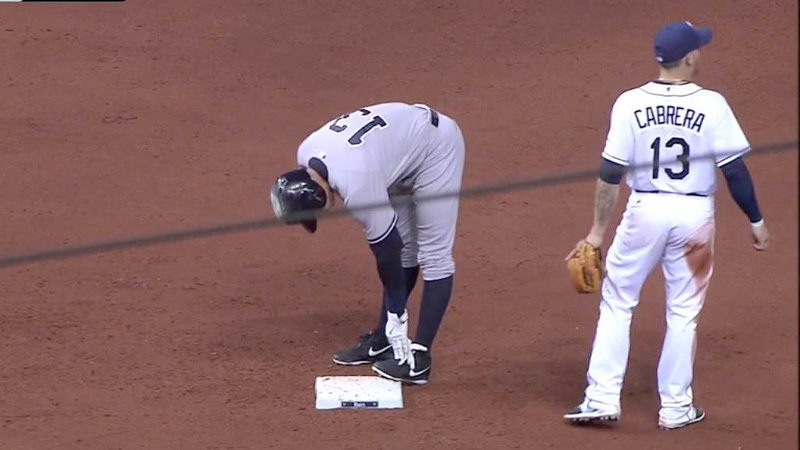In the game of baseball, there are numerous intricacies and scoring judgments that add depth to the sport. One such aspect is defensive indifference, a rule that comes into play during specific game situations.
Defensive indifference occurs when the defensive team chooses not to make an effort to stop a baserunner from advancing to the next base. This scoring judgment reflects strategic decisions made by the defense when they have a comfortable lead late in the game.
While defensive indifference may seem perplexing to some, it serves as a fascinating element that showcases the strategic nuances and calculations inherent in baseball.
In this article, we will delve into the world of defensive indifference and explore its various aspects in the context of baseball.
What Is Defensive Indifference In Baseball?
Defensive indifference in baseball refers to a situation in which the defensive team allows a baserunner to advance to the next base without attempting to get them out.
It typically occurs in late-game scenarios when the team playing defense has a significant lead, usually by two runs or more. The term “indifference” implies that the defense is not actively trying to prevent the baserunner from advancing.
How Defensive Indifference is Officially Scored in Baseball
In terms of scoring, defensive indifference is a judgment made by the official scorer. If the scorer determines that the defense did not make a genuine effort to stop the baserunner from advancing, they may rule the play as defensive indifference.
This means that the baserunner is not credited with a stolen base, even if they successfully advance to the next base.
Scorer’s Judgment and Subjectivity in Determining Defensive Indifference
The determination of defensive indifference relies on the scorer’s judgment, which can introduce a level of subjectivity.
The scorer considers various factors when making this judgment, such as the score of the game, the number of outs, and the baserunner’s position relative to scoring. They assess whether the baserunner’s advancement would have any significant impact on the outcome of the game.
While there are some guidelines and general consensus among scorers, there can be variations in how different scorers interpret defensive indifference.
The decision may also be influenced by the specific circumstances and context of the game. Therefore, there can be debates or disagreements regarding the application of defensive indifference in certain situations.
Factors That Contribute to Defensive Indifference

Several situational factors contribute to the occurrence of defensive indifference in baseball. One significant factor is late-game situations when the team playing defense has a substantial lead over their opponent.
When a team is comfortably ahead by a significant margin, they may choose to allow the baserunner to advance without attempting to make a play on them.
This decision is often based on the belief that the baserunner’s advancement would have minimal impact on the outcome of the game.
The number of outs and baserunners on the field also plays a role in defensive indifference. Typically, defensive indifference is more likely to occur when there are two outs in an inning.
Strategic Considerations for the Defensive Team
Allowing defensive indifference involves strategic considerations for the team playing defense. One primary strategic consideration is focusing on more important defensive priorities.
Instead of diverting their attention and resources to prevent the baserunner from stealing a base, the defense may choose to allocate their efforts towards more crucial defensive plays, such as preventing a potential hit that could drive in multiple runs.
Another strategic consideration is preventing potential big innings. By allowing the baserunner to advance without resistance, the defense avoids escalating the situation and potentially gives the opposing team an opportunity to build momentum.
By maintaining their position and focusing on securing the final out of the inning, the defensive team aims to minimize any potential damage and maintain their lead.
These strategic considerations reflect the balancing act that teams perform in managing their defensive strategies.
While preventing stolen bases is generally a priority, late-game situations and the context of the game can lead to the decision of defensive indifference, strategically focusing on more significant defensive objectives and minimizing potential risks.
Impact of Defensive Indifference on Baserunning and Stolen Bases
To understand the impact of the defensive Indifferences on baserunning and the stolen base, we need to go through the following points.
Stolen Bases and Their Significance in Baseball
Stolen bases are a fundamental aspect of baserunning in baseball. When a baserunner successfully advances to the next base while the pitcher is delivering the pitch, it is considered a stolen base.
Stolen bases require skill, speed, and timing, as the baserunner must outrun the catcher’s throw to the next base.
Stolen bases are significant in baseball for several reasons. They provide a means for baserunners to gain an extra base without relying on a hit from the batter.
Stolen bases can put pressure on the defense, forcing them to be more vigilant and potentially leading to defensive mistakes. They can also disrupt the rhythm of the opposing pitcher, affecting their focus and ability to execute pitches.
Differentiating Between Stolen Bases and Defensive Indifference
Defensive indifference differs from stolen bases in that it occurs when the defensive team makes a strategic decision not to make an effort to prevent the baserunner from advancing.
In cases of defensive indifference, the baserunner is not credited with a stolen base, even if they successfully reach the next base.
The key distinction between stolen bases and defensive indifference lies in the intent and effort of the defense. In stolen bases, the defense actively tries to throw out the baserunner and prevent their advancement.
In contrast, defensive indifference arises when the defense considers the baserunner’s advancement inconsequential to the outcome of the game and chooses not to make a play.
Cases Where Stolen Bases Are Awarded Despite Defensive Indifference
While defensive indifference typically results in no stolen base being awarded, there are situations where the official scorer may still credit the baserunner with a stolen base.
This can occur if the scorer believes that even if the defense had attempted to make a play, the baserunner would have been safe. In such cases, the scorer deems the baserunner’s advancement a result of their speed and timing rather than the defense’s lack of effort.
These cases of stolen bases awarded despite defensive indifference are relatively rare and depend on the scorer’s judgment.
They often involve scenarios where the baserunner’s speed is exceptional, making it likely that they would have successfully stolen the base even if the defense had tried to stop them.
Examples and Scenarios

Here are some of the notable examples of Defensive Indifference in different game situations:
Late-game Scenarios With a Comfortable Lead
Let’s consider a situation where the home team is leading by six runs in the bottom of the eighth inning. The visiting team has a runner on first base with two outs. In this case, the defensive team may choose to prioritize getting the final out of the inning rather than making an effort to prevent the baserunner from stealing second base. The defense aligns itself as if the baserunner is not a threat, and the runner advances to second base without any opposition.
Two Outs and Baserunners Not in Scoring Position
Another scenario where defensive indifference often comes into play is when there are two outs in the inning and the baserunners are not in the scoring position. For example, in the top of the ninth inning, the away team is leading by three runs, and they have a runner on first base. The defense, recognizing that the runner’s advancement to second base would not significantly impact the game’s outcome, may choose not to make a play on the baserunner. The runner proceeds to steal second base without any resistance from the defense.
Impact of Defensive Indifference on The Game
The impact of defensive indifference on the outcome of the game depends on various factors such as the score, number of outs, and baserunners on the field.
In situations where the defensive team has a comfortable lead and allows defensive indifference, the impact on the outcome may be minimal. The baserunner’s advancement does not affect the overall result because the defense still maintains a significant lead.
However, there can be instances where defensive indifference has unintended consequences. For example, if the baserunner successfully steals multiple bases due to defensive indifference, it can provide an opportunity for a potential comeback by the opposing team.
In close games or situations where the baserunner’s advancement could lead to a scoring opportunity, defensive indifference may backfire if the opposing team capitalizes on the extra baserunner.
It is important to note that defensive indifference is a strategic decision made by the defensive team based on the context of the game.
The outcome of the game relies on multiple factors, and while defensive indifference may play a role, it is just one element among many in determining the final result.
Critiques and Controversies on Defensive Indifference
The defensive indifference rule and its scoring judgment have faced some critiques from baseball enthusiasts. One common critique is the subjectivity involved in determining defensive indifference.
Since the official scorer’s judgment plays a significant role in awarding stolen bases or labeling a play as defensive indifference, there can be disagreements and inconsistencies in scoring decisions. This subjectivity raises concerns about the fairness and accuracy of the scoring process.
Another critique revolves around the potential impact on individual player statistics. Baserunners who would have successfully stolen a base under normal circumstances may not receive credit for the stolen base due to defensive indifference.
This can affect stolen base records and individual player achievements, leading to debates about the legitimacy and accuracy of statistical records.
Controversies and Disagreements Among Players, Coaches, and Fans
Controversies and disagreements surrounding defensive indifference often arise when scoring decisions affect the outcome of games or individual performances.
Players and coaches may dispute scoring judgments, arguing that the baserunner should have been credited with a stolen base instead of defensive indifference. Such disagreements can be heated, especially in high-stakes situations.
Fans also contribute to the controversies, expressing their opinions through social media, sports forums, and other platforms.
The subjective nature of defensive indifference scoring can lead to passionate debates among fans, with each side defending their perspective on whether a stolen base should have been awarded or not.
Alternative Approaches or Rule Changes
Given the critiques and controversies surrounding defensive indifference, there have been discussions about potential alternative approaches or rule changes.
One suggestion is to implement a more objective criterion for determining defensive indifference, such as basing it solely on the catcher’s decision not to throw to the base. This could provide clearer guidelines for scoring and reduce the subjectivity involved.
Another proposal is to revise the scoring system to differentiate between stolen bases and defensive indifference in statistical records. This would address concerns about individual player achievements and ensure that stolen base records accurately reflect players’ baserunning abilities.
Rule changes related to defensive indifference could also be considered, such as adjusting the conditions under which defensive indifference is allowed or revisiting the strategic implications for the defensive team.
These changes would aim to address the controversies and enhance the clarity and fairness of the rule.
The critiques, controversies, and discussions surrounding defensive indifference highlight the need for ongoing evaluation and potential improvements to ensure consistency, fairness, and accuracy in scoring judgments and rule applications.
Scoring and Implications of Defensive Indifference in Baseball
Topic | Description |
Definition of Defensive Indifference | Explanation of defensive indifference in Baseball and its Significance |
Scoring Judgment | The role of the official scorer in determining defensive indifference |
Situational Factors | Factors that contribute to defensive indifference in game situations |
Strategic Considerations | The strategic considerations for the defensive team in allowing indifference |
Impact on Baserunning and Stolen Bases | Differentiating between stolen bases and defensive indifference |
Cases of Awarded Stolen Bases | Scenarios where stolen bases are awarded despite defensive indifference |
Critiques of the Rule and Scoring Judgment | Critiques of the defensive indifference rule and scoring judgment |
Controversies and Disagreements | Instances of disagreements among players, coaches, and fans |
Alternative Approaches and Rule Changes | Discussions on potential changes to improve the rule and scoring |
FAQs
How does defensive indifference impact the baserunner’s statistics?
Defensive indifference can affect a baserunner’s statistics by denying them a stolen base credit. Even if the baserunner successfully advances to the next base without an attempt to get them out, it is recorded as defensive indifference rather than a stolen base.
This can have implications for individual player achievements and statistical records.
Can defensive indifference occur in situations other than late-game scenarios?
While defensive indifference often occurs in late-game scenarios when the team is winning by a significant margin, it can also happen in other situations. The key factor is the judgment of the official scorer, who assesses whether the defense made a deliberate decision not to try to stop the baserunner.
It is possible for defensive indifference to occur earlier in the game if the situation and context warrant it.
Are there any rule changes proposed to address controversies surrounding defensive indifference?
There have been discussions about potential rule changes to address the controversies surrounding defensive indifference. Some proposals include implementing a more objective criterion for determining defensive indifference, revising the scoring system to differentiate between stolen bases and defensive indifference in statistical records, and adjusting the conditions or strategic implications of defensive indifference.
These proposals aim to enhance clarity, fairness, and consistency in scoring judgments and rule applications.
Can defensive indifference impact the outcome of a game?
Defensive indifference alone may not directly impact the outcome of a game, as it typically occurs in situations where the defensive team already has a comfortable lead. However, the strategic decisions made by the defensive team in allowing defensive indifference can indirectly affect the game’s outcome.
By focusing on more important defensive priorities and preventing potential big innings, the defensive team aims to secure their advantage and minimize the chances of a comeback by the opposing team.
Conclusion
Defensive indifference is a scoring judgment in baseball that occurs when the defensive team allows a baserunner to advance to the next base without making an effort to get them out.
It typically happens in late-game situations when the team playing defense has a comfortable lead and prioritizes other defensive strategies over stopping the baserunner.
The official scorer plays a crucial role in determining defensive indifference, although there can be some subjectivity involved. While defensive indifference may not directly impact the outcome of a game, it reflects the strategic decisions made by the defense to maintain its advantage.
Despite some critiques and controversies surrounding the rule and scoring judgment, discussions continue about potential rule changes to enhance clarity and fairness.
Defensive indifference is an intriguing aspect of baseball that adds complexity to the game’s strategy and scoring system. Thank you for your time.







